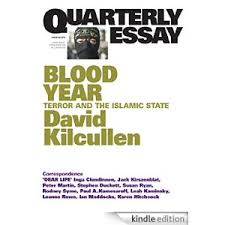Last year was a “blood year” in the Middle East – massacres and beheadings, fallen cities, collapsed and collapsing states, the unravelling of a decade of Western strategy. We saw the rise of ISIS, the splintering of government in Iraq, and foreign fighters – many from Europe, Australia and Africa – flowing into Syria at a rate ten times that during the height of the Iraq War. What went wrong?
In Blood Year, David Kilcullen calls on twenty-five years’ experience to answer that question. This is a vivid, urgent account of the War on Terror by someone who helped shape its strategy, as well as witnessing its evolution on the ground. Kilcullen looks to strategy and history to make sense of the crisis. What are the roots and causes of the global jihad movement? What is ISIS? What threats does it pose to Australia? What does its rise say about the effectiveness of the War on Terror since 9/11, and what does a coherent strategy look like after a disastrous year?
“As things stand in mid-2015, Western countries . . . face a larger, more unified, capable, experienced and savage enemy, in a less stable, more fragmented region. It isn’t just ISIS – al-Qaeda has emerged from its eclipse and is back in the game in Afghanistan, Pakistan, India, Syria and Yemen. We’re dealing with not one, but two global terrorist organisations, each with its own regional branches, plus a vastly larger radicalised population at home and a massive flow of foreign fighters.”—David Kilcullen, Blood Year
David Kilcullen was a senior advisor to General David Petraeus in 2007 and 2008, when he helped to design and monitor the Iraq War coalition troop “surge.” He was then appointed special advisor for counterinsurgency to US Secretary of State Condoleezza Rice. Before this, from 2005 to 2006, he was chief strategist in the Counterterrorism Bureau of the US State Department. He has also been an adviser to the UK and Australian governments, NATO and the International Security Assistance Force. He is a former Australian Army officer and the author of three acclaimed books: The Accidental Guerrilla, Counterinsurgency and Out of the Mountains.
David Kilcullen had a gift rarely found in academics, the ability to communicate.
In the opening riff of his seminal essay Blood Year: Terror and the Islamic State David Kilcullen sets bizarre atmospherics the scene of a November 2014 summit in Saudi Arabia. Surrounded by desert, as he and his driver approached the conference centre come resort, they pass through ever tightening rings of security. On the drive across the desert from Abu Dhabi he has been confronted by classic Arabic scenes, battlements and minarets.
“However odd the setting, this is deadly serious: a conference, long-scheduled, that has turned into a crisis meeting in this year of massacres and beheadings, fallen cities and collapsing states – the unravelling, in weeks, of an entire decade of Western strategy. Former prime ministers and presidents, current foreign ministers, generals, ambassadors and intelligence chiefs are here, with White House staffers, presidential envoys, leaders from the Middle East and Africa, Americans, Brits and Aussies, Iranians, Russians, Chinese and Indians…
“Maybe it’s my jetlag, but people look dazed, as if in the grip of a hangover. If so, it’s a geopolitical one: the rise of ISIS, the failure of the Arab Spring, the fracturing of Iraq and the spillover of violence from Syria have suddenly, dangerously destabilised the Middle East and North Africa.
“In the northern summer of 2014, over roughly one hundred days, ISIS launched its blitzkrieg in Iraq, Libya’s government collapsed, civil war engulfed Yemen, Abu Bakr al-Baghdadi declared himself Caliph, the latest Israel–Palestine peace initiative failed in a welter of violence, and the United States and its allies (including the United Kingdom and Australia) sent aircraft and troops back to Iraq. Russia, a key sponsor of Bashar al-Assad in Damascus, reignited Cold War tensions by annexing Crimea, sent submarines and aircraft to intimidate its neighbours in their own sea and airspace, and supported Ukrainian rebels who shot down an airliner with huge loss of life. Iran continued its push for nuclear weapons, supported Assad in Syria and yet became a de facto ally of the United States in Iraq, as each sought, for different reasons, to bolster the Baghdad government.”


